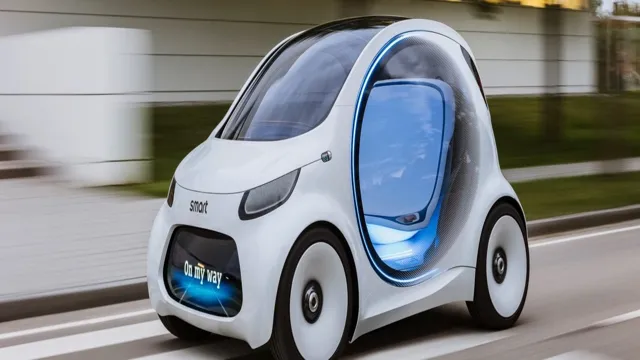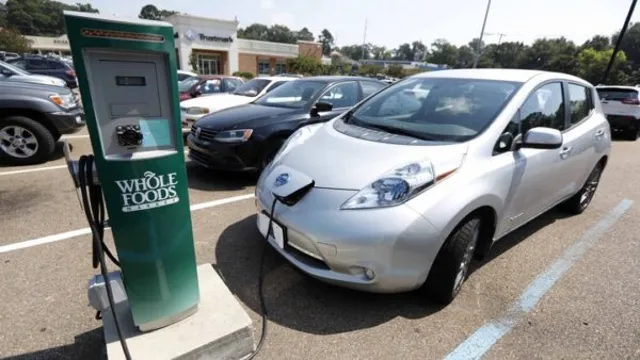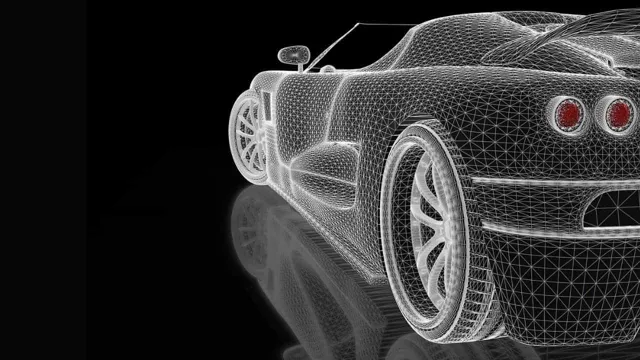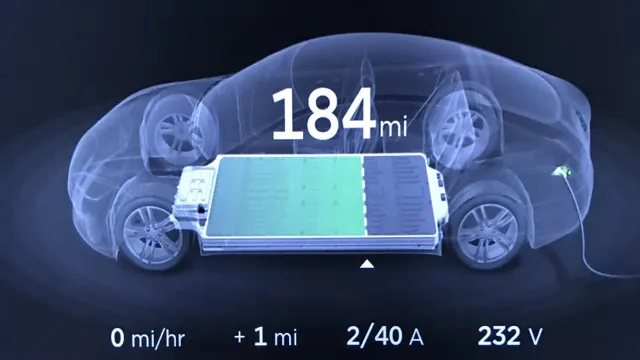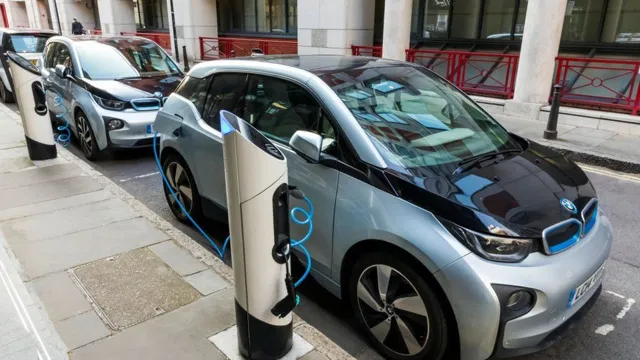Revolutionizing the Roads: Unveiling the Latest Electric Car Innovation Technology
Electric car innovation technology is taking the world by storm, with a swift transition towards sustainable mobility happening across various industries. Not only are electric cars better for the environment and can help reduce our carbon footprint, but they also offer superior performance and driving experience. The days of range anxiety and slow charging times are slowly becoming a thing of the past, as automakers invest heavily in developing new and exciting technologies.
From extended battery life to wireless charging, companies are racing against each other to produce the most efficient and advanced electric cars. In this blog, we will explore the latest innovations in the electric car industry and their potential impact on the future of transportation. If you’ve been curious about the future of cars and how technology is revolutionizing the way we drive, then this is a blog you won’t want to miss.
The Rise of Electric Cars
Electric car innovation technology has been one of the biggest advancements in the automotive industry in recent years. With concerns over climate change and rising fuel prices, more and more automakers are investing in the development of electric cars. These vehicles are powered by rechargeable batteries, which provide a clean and efficient source of fuel.
Thanks to advances in battery technology, electric cars are now capable of traveling further distances on a single charge and can even be charged much faster. Additionally, many of them boast impressive features such as regenerative braking, self-driving capabilities, and integrated smartphone apps. With more and more consumers starting to realize the benefits of electric cars, it’s no surprise that their popularity is on the rise.
Statistical Data on the Growth of Electric Cars
Electric cars have been on the rise in recent years, with a significant increase in sales and adoption around the world. According to statistical data, the global stock of electric cars reached 10 million in 2020, a number that has been steadily growing over the past decade. The increase can be attributed to a variety of factors, including government incentives and regulations, advancements in technology, and a growing environmental consciousness among consumers.
As more countries strive to phase out traditional gas-powered vehicles in favor of electric ones, we can expect to see even greater growth in the coming years. With electric cars becoming more mainstream, it’s clear that they are no longer just a niche segment of the market but a viable option for consumers looking to reduce their carbon footprint.
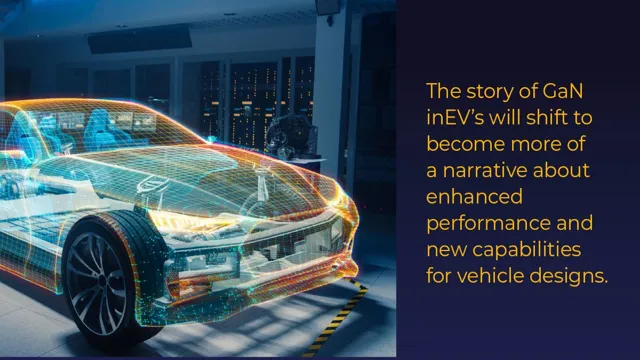
How Electric Cars Work
Electric cars have become increasingly popular over the past few years, with more and more drivers opting for this eco-friendly alternative to traditional gas-powered vehicles. These cars work by using an electric motor and battery to power the vehicle, rather than a combustion engine. The battery is charged by plugging it in at a charging station or at home, allowing the car to run on electricity alone.
This means that electric cars produce zero emissions and offer a much cleaner, more efficient mode of transportation. Additionally, the rise of electric cars has led to advancements in battery technology, making them more powerful and longer-lasting than ever before. As more people make the switch to electric cars, we can expect to see a decrease in air pollution and a more sustainable future for transportation.
Innovations in Electric Car Technology
Electric car innovation technology continues to evolve, with many exciting advancements on the horizon. One area where progress is being made is in battery technology. Higher energy density and faster charging times are being developed, making electric cars more convenient than ever before.
Additionally, self-driving technology is being integrated into electric cars, which will make them even safer and increase their appeal to consumers. Moreover, innovative designs are being implemented into electric cars, making them sleeker and more stylish. With these advancements, it’s easy to see why electric cars are becoming more popular among drivers all over the world.
As electric car innovation technology continues to progress, it is possible that electric cars will eventually become the norm.
Battery Technology Improvements
Electric car technology is evolving rapidly, and one of the most important areas of development is battery technology. One of the biggest criticisms of electric vehicles has been their limited range and long charging times. However, with recent innovations in battery technology, range anxiety is becoming less of a concern for potential electric car buyers.
Lithium-ion batteries, which are the most widely used type of battery in electric cars today, have seen significant improvements in their energy density and longevity. That means they can store more electricity and last longer between charges. Additionally, manufacturers are exploring new battery chemistries like solid-state batteries and lithium-sulfur batteries that have the potential to store even more energy in smaller, lighter packages.
These advancements in battery technology are allowing electric cars to perform more like gasoline-powered cars, making them a more attractive option for consumers.
Wireless Charging Technology
Electric car technology has come a long way in recent years, and one of the most exciting innovations has been wireless charging. This technology allows vehicle owners to simply park their car over a special charging pad and have the battery recharge without any cords or plugs. It’s a game-changer for those who want to make the switch to electric vehicles but worry about the inconvenience of charging.
With wireless charging, you can simply pull into your garage or parking space, and the technology takes care of the rest. Imagine how much simpler trips would be if you could charge your car without having to search for a charging station or physically connect cables to your vehicle. While still in its early stages, wireless charging has the potential to revolutionize the electric vehicle industry and make driving an electric car even more convenient.
Advanced Motor Technologies
Electric car technology has come a long way over the past few years and one of the biggest innovations in this field is the advanced motor technologies being developed. These advanced motors use different techniques to improve their efficiency, power output, and reduce their weight. For example, some motors use rare earth magnets, while others use copper rotors, both of which allow electric cars to achieve a greater range than traditional gas-powered cars.
Another innovation is the use of regenerative braking, which allows electric cars to recharge their batteries while braking, further enhancing their energy efficiency. Additionally, motor controllers have become more advanced, allowing for smoother acceleration and greater control over speed, which is another factor contributing to the increasing popularity of electric cars. As electric car technology continues to evolve, we can expect to see even more advanced motor technologies emerging, making them an even more attractive option for drivers looking for an eco-friendly and efficient vehicle.
The Future of Electric Cars
The future of electric cars looks bright as continuous innovation in technology is driving up their efficiency, range, and affordability. One of the most notable changes we can expect to see is the size of the batteries. With advancements in nanotechnology, companies are developing next-generation batteries that pack more power into smaller packages.
This not only increases the range of electric vehicles but also makes them lighter and easier to maneuver. Furthermore, the development of wireless charging is set to revolutionize the way we charge our cars. Instead of the traditional plug-and-charge method, we can park our vehicles in designated wireless charging spots, which will be widely available.
These spots will use magnetic resonance technology to wirelessly transfer energy to our cars. With all these exciting developments on the horizon, it’s clear that electric cars are set to become the future of transportation, and the use of this clean energy technology will help us to reduce the carbon footprint and create a more sustainable world.
Trends in Electric Car Technology
Electric Car Technology The future of electric cars looks bright, with rapid advancements in technology pushing the limits of what’s possible. One key trend in electric car technology is the development of more efficient batteries with longer ranges, reducing the need for frequent charging and improving the overall driving experience. In addition, the use of regenerative braking systems that capture energy lost during braking is becoming increasingly common, further improving efficiency and reducing emissions.
Another notable trend is the integration of smart features, such as real-time route planning, vehicle-to-grid communication, and app-based controls. These features give drivers greater control over their electric vehicles and help to optimize energy usage. With these advances, electric cars are becoming increasingly practical and affordable for everyday use, making them a compelling alternative to traditional gas-powered vehicles.
Whether you’re an environmentalist or simply looking for a more efficient ride, the future of electric car technology has something to offer everyone.
Expected Innovations in the Future of Electric Cars
The future of electric cars is looking exciting as new innovations are expected in the industry. One of the most anticipated advancements is the development of solid-state batteries, which offer higher energy density and faster charging times than traditional lithium-ion batteries. This means that electric cars will be able to go further on a single charge and charge up quickly, making them even more convenient for drivers.
Another expected innovation is the use of wireless charging technology, so drivers can charge their cars simply by parking them over a charging pad, just like their smartphones. As electric cars become more mainstream, we can also expect to see continued improvements in their design and features, such as autonomous driving capabilities and sleeker, more aerodynamic designs. The future of electric cars is bright, and it’s exciting to imagine the potential for cleaner and more sustainable transportation that they offer.
Conclusion
Innovation in electric car technology has come a long way, revolutionizing the automobile industry as we know it. From its humble beginnings to the sleek, high-powered models of today, the electric car has changed the game and paved the way for a more sustainable future. As more and more consumers opt for cleaner, more efficient vehicles, it’s clear that this is one technology that has electricified the world and won’t be slowing down anytime soon.
“
FAQs
What is an electric car?
An electric car is a vehicle that is powered by electric motors instead of a traditional gasoline engine.
How does an electric car work?
An electric car is powered by a battery that sends electricity to an electric motor, which then turns the car’s wheels. The batteries are recharged by plugging the car into an electrical outlet.
What are the benefits of electric cars?
There are several benefits of electric cars, including lower emissions, lower operating costs, quieter operation, and the ability to charge at home.
What kind of innovation can we expect to see in electric cars in the future?
We can expect to see continued improvements in battery technology, faster charging times, more efficient electric motors, and increased range for electric vehicles in the future. Additionally, we may see new features such as self-driving capabilities and advanced safety systems.
